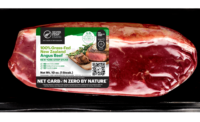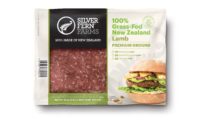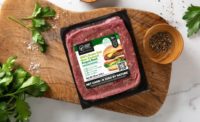Silver Fern Farms — New Zealand’s largest producer of 100% grass-fed beef, lamb and venison products for the U.S. market — will soon announce a new Net Carbon Zero product in 2023 as a follow-up to its rollout of its USDA-approved Net Carbon Zero By Nature branded Angus beef product.
David Patragnoni, USA country manager for Silver Fern Farms, provides some insights into Silver Fern Farms’ 2023 expansion plans, retail consumer behavior toward grass-fed beef and Net Carbon Zero beef products.
The National Provisioner: What growth opportunities does retail consumer-purchasing behavior toward grass-fed beef present?
David Patragnoni: ‘Earth-friendly eating’ is a common belief and behavior today. 77% of consumers believe sustainability is important when selecting products to buy (up eight points from 2021)*. Consumers are exercising values choices right across the supermarket aisles, and in the beef aisle the earth-friend ly eating choices are focused on grass-fed. The grass-fed category is growing at 21% — over twice as fast as the total beef category (8.7%)**. The choice for shoppers is between grass-fed beef that comes from happy, low-stress animals living in beautiful pastures, or grain-fed beef from feedlot animals from the industrial meat system. This is a values choice. U.S. consumers are mainly looking for taste, consistency and health benefits, but they also like the positive animal welfare story and the environmental upsides attached to the grass-fed label.
ly eating choices are focused on grass-fed. The grass-fed category is growing at 21% — over twice as fast as the total beef category (8.7%)**. The choice for shoppers is between grass-fed beef that comes from happy, low-stress animals living in beautiful pastures, or grain-fed beef from feedlot animals from the industrial meat system. This is a values choice. U.S. consumers are mainly looking for taste, consistency and health benefits, but they also like the positive animal welfare story and the environmental upsides attached to the grass-fed label.
Our herds are grass-fed, all year-round. Here, the climate, clean air and plentiful pure water fuel the year-round growth of lush, green pastures. The animals are raised year-round on this pasture, with the ability to roam and graze freely. The animals can eat and live as they would naturally — reducing stress and promoting better animal welfare. Our ability to grow quality, nutritious grass year-round, means we produce animals more naturally, with little intervention. The result is high quality, tasty, tender red meat. A diet of nutrient-rich grass produces natural marbling and gives a fine, delicate texture.
The moment of truth is taste. Grass-fed presents a bolder, beefier flavor. From a personal point of view, I’ve worked in the red meat business for 30 years and one of the two reasons I’m USA country manager for Silver Fern Farms is the taste performance of the product. If it didn’t taste the best, I wouldn’t be here. As an exporter and marketer, we know that our pastoral farming system already has many of the attributes consumers are looking for. We continue to invest, innovate, and support those working the land to ensure our farms are seen to be the best in the world.
NP: What sustainability advantages do net carbon zero beef products offer for producers?
David Patragnoni: The No. 1 benefit of our Net Carbon Zero beef is that consumers can be confident that every single kilogram of CO2 emissions associated with that product is counted and removed by vegetation growing on the farms where it was produced. Beef is the leading carbon emitter of all food types. Governments everywhere are looking at every way in which carbon emissions can be reduced. Increasingly they are resorting to regulation to compel producers to be transparent about their emissions, to initiate new labeling requirements, to levy or tax carbon producers. Retailers are very conscious of their own emissions profile, not only in terms of their operations and building footprints but also in which products they stock.
Even though Silver Fern Farms is at the start of its journey, we feel we are well ahead of the curve with Net Carbon Zero beef products in the market. We believe our method of achieving net carbon zero in a natural biological setting rather than purchasing offsets is unique.
The second advantage is that New Zealand has a uniquely biodiverse farming environment, with on-farm vegetation including regenerating native bush, woodlot forests, shelter belts, summer shade and winter animal shelter, soil stability, and riparian planting. The trees in this case that contribute to biodiversity are the key to Silver Fern’s Net zero carbon methodology of “insetting” — meaning all the carbon produced in growing the product is accounted for and being absorbed by trees growing on the farms where it is produced.
The third advantage is our farmers. Silver Fern Farms is the largest red meat producer in New Zealand. We embrace the Māori concept of Kaitiaki, or guardianship of the land. This leads to the belief that taking care of our emissions is our own responsibility and no one else's. We don’t outsource our emissions, and instead recognize and incentivize our farmers for their efforts to create farm environments that better capture carbon, increase biodiversity, and support a path to nature positive food production.
New Zealand’s grass-based system optimizes natural resources and uses low-intensity farming practices to minimize environmental impact. Farmers utilize a natural abundance of rainwater to grow grass, optimizing livestock growth to match the natural grass growth curve. Animals are raised year-round with the ability to roam and graze freely on a diverse diet of rich clover, rye grasses and conserved forages such as hay and silage. They eat and live as they would naturally, which in turn leads to tender red meat with an all-round better eating quality.
Taken together, this is the second reason why I work for Silver Fern Farms. The Net Carbon Zero achievement puts the brand well ahead of all other red meat farming systems in terms of environmental performance.
NP: What are Silver Fern Farms’ 2023 retail expansion plans?
David Patragnoni: Growing our store count is the No. 1 objective. Our products are carried in about 1,600 stories nationwide, with concentrations in the New York Tri-state area, California and the Midwest. We want to continue to grow our store distribution as well as our direct-to-consumer business through our e-commerce platform. And in 2023 we will engage with consumers and shoppers and build awareness of the benefits of our grass-fed products through in-store sampling, tastings, demonstrations, and experiential events that we have been unable to do over the past few years during COVID restrictions.
Importantly, we have a trifecta of red meat products across beef, lamb and venison. We have the only Net Carbon Zero product in the market achieved within the farming system itself. New Zealand is by far the world’s leader in deer farming. We pioneered the practice, and the Silver Fern Farms ground venison product has been a big hit across the Midwest with its lean and healthy taste attributes, and we are looking to expand deeper in the Midwest and to both coasts.
Supply is a key issue for retailers who look for constancy of product, scalability and quality consistency. Silver Fern Farms produces at scale with 16,000 farmers in our cooperative, 14 processing sites. We produce grass-fed beef all year-round. We have secure shipping mechanisms and a well-developed distribution system in the U.S. We are vertically integrated and have a 50-year record of global exporting.
NP: With North America projected to contribute 27% of grass-fed beef’s market growth by 2027, why are consumers increasingly choosing grass-fed beef?
David Patragnoni: Compared to grain-fed, grass-fed red meat is naturally leaner, has less total fat, less saturated fat and fewer calories than grain-fed red meat. It is also packed with vitamins and minerals and nutrients that are important for health and wellbeing, including iron, protein, amino acids, vitamin B12, zinc, B vitamins and vitamin D, higher levels of omega-3 fatty acids and a healthier omega-3 to omega 6 ratio, and is higher in antioxidants and conjugated linoleic acids. Silver Fern Farms red meat is minimally processed with no added growth hormones. Our Net Carbon Zero beef and 100% grass-fed beef and lamb products have had no antibiotics ever.
Our ability to grow quality, nutritious grass year-round means we produce animals more naturally, with little intervention. The result is high quality, tasty, tender red meat. A diet of nutrient-rich grass produces natural marbling and gives a fine, delicate texture.
The grass-fed label is a kind of shorthand for positive health attributes like being antibiotic free and growth hormone free — and customers in the U.S. are prepared to pay a premium for it.
NP: Since launching Net Carbon-Zero Certified Beef products in the U.S. last year, how have the products been received in the U.S. grocery market?
David Patragnoni: We feel we have communicated strongly and achieved a reputation for consistent delivery of a market-leading product. The significance of bringing Net Carbon Zero Beef By Nature to the U.S. market was underscored in the May 2022 New York City launch by New Zealand Prime Minister Jacinda Ardern. PM Ardern also went on the “Colbert Show” and messaged about our product designed to meet consumer demand for climate-neutral products.
The imperative of having a Net Carbon Zero product has created an open door for sales conversations with retailers who are very informed about both the top-down and bottom-up elements of reducing emissions. We commenced with Net Carbon Zero By Nature distribution with 75 New York City supermarkets and expanded to California and the Midwest. We are very happy about our progress to date and having completed a journey of several years to bring this to market. We are looking forward to 2023 to scale our competitive advantages.
*Iri NYU/Stern Sustainability and the Consumer September 2022
**Spins (Powered by IRi); Total Frozen and Refrigerated Meat Poultry and Seafood; FZ&RF Beef & Pork Cuts; Animal Type Beef, Labeled Grass-fed, Dollars % Chg vs YA, Total MULO, 24 weeks to 10/30/2022).

.png?height=96&t=1647275041&width=96)





